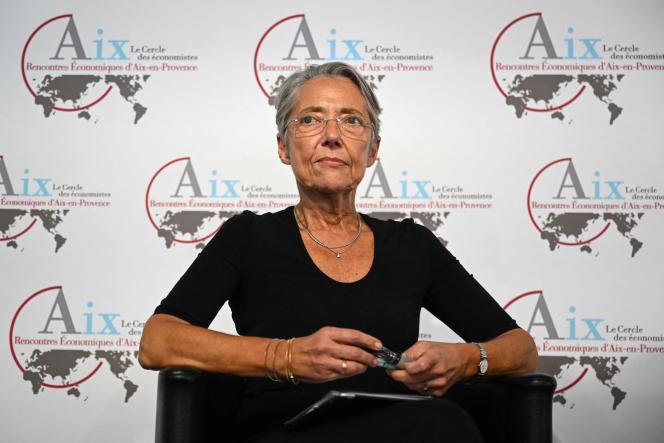The tariff shield on energy prices could be replaced by more targeted aid for low-income French people next year, Prime Minister Elisabeth Borne announced on Saturday July 9 in Aix-en-Provence (Bouches -du-Rhone).
“We are not going to expose the most modest French people to reckless increases in the price of energy,” assured the head of government to the press, gathered on the sidelines of the Aix Economic Meetings. “If there were no shield” on gas prices or caps on electricity prices, “electricity would be a third more expensive, and gas 45-50%” more expensive, a she asserted. The Prime Minister added:
“We can’t imagine asking the French, starting with the modest French, to pay 45% more for their gas or a third more for their electricity. »
However, given the cost of the tariff shield for the State, “we must move from general mechanisms to more targeted mechanisms”, judged Elisabeth Borne. “The work is in progress,” she said.
A tax on possible excess profits “not completely simple”
The government has already announced on Thursday that targeted aid for people who take their car to work would take over in October from the general discount of 18 cents on the price of a liter of fuel, which will gradually decrease and then increase. shut down permanently in December.
Asked about the advisability of introducing a tax on possible “surplus profits” that energy companies would realize thanks to the sharp rise in energy prices, Ms. Borne was more evasive.
“In principle, of course, if there are people who derive superprofits from the crisis, we would like that to benefit everyone and lighten the burdens that the crisis can generate. »
“Afterwards, it’s not completely simple,” she immediately qualified. “Many of our neighbors have put in place mechanisms to tax these excess profits”, but “we are not in the same situation” in France, according to her.
On the one hand, “EDF has production difficulties today on its nuclear fleet and we import massively” electricity from abroad, underlined the Prime Minister, who therefore rules out the existence of “surplus profits for the energy company. On the other hand, “we have oil companies that have distribution activities in France, [but] which do not generate superprofits”, according to Ms. Borne.

















